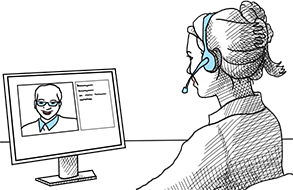What we teach? How we teach? And why we teach that way?
Our educational system is based on five key principles
We strive to ensure that students were comfortable with us and training took place in a friendly atmosphere, that students get the result, which they aimed for, and learning environment helps them to develop. We would like you to come back again, learn foreign languages and learn the world through them.
 | In the classroom we form and develop SKILLS: |
Linguistic
Ability to read, listen and understand foreign speech, ability to enrich their vocabulary and use when communicating correctly and to the point.
Personal development
Continuous enrichment of knowledge, their critical thinking and analysis, search for new knowledge skill, reasoning skills and expressing point of view skills.
Communication
The ability to communicate freely with peers, adults, people of different countries and cultures without communication barrier.
Academic
Skills required for most studies: time-management, listening and summarizing skills, making presentations and presenting, writing term and research papers.
Examinational
Exam techniques and strategies. How to read the text quickly and do the task effectively? How to understand the main idea of any text that contains many unfamiliar words? How to write a letter in 15 minutes?
Developing these skills, we teach our students to use a foreign language competently and correctly in any situation, both orally and in writing. Turning to new levels of education, our students broaden and deepen their already acquired skills, and thus improve their language proficiency.
 | Education environment is the space in which we live, learn, interact with each other
and improving. |
Apart from classes, communication and development environment includes:
- clubs
- hobby classes
- special courses
- workshops
- weekend trips
- summer camps and schools in the countryside
- educational trips abroad
- meetings with native speakers and students of foreign universities
Creating such a rich environment allows you not only to learn foreign languages faster and more efficiently, but also helps even the youngest students to adapt to modern teaching and everyday realities.
 | Innovation and creativity Each year, we offer our students not only exciting additions to existing programs, but also completely new courses and teaching methods. |
Examples of such innovations are:
- culture classes
- unique show–lessons
- linguistic workshops
- online classes with native speakers
- interactive joint lessons for parents and children
- lessons and meetings with students of English universities
- joint projects of different Language Schools and departments of the Company
Innovative and creative environment in Language Schools is created and supported by the whole team, as well as the students involved in this process.
 | Customer - We are aimed at understanding client`s needs and abilities
- We formulate specific goals for the academic training period together with the customer
- We create appropriate educational paths to achieve the goal of learning, using our resources
|
A whole team of experts works on these tasks, providing customer support: a manager, a teacher, the Head of the Language School, a teacher trainer, the Head of the Network of Language Schools, the Director of the Company.
Through personal interviews, lessons, informational materials, consultations via e-mail and phone we aim to establish a permanent and productive communication with each client in order to bring our ideas, experiences and opportunities to them and help achieving their personal educational goals.
 | Quality control The quality control system in our company consists of: Students` knowledge quality control, monitoring the quality of teaching and service. |
Quality control of knowledge. Assessment of the quality of students` knowledge level includes a system of tests:
- Level test (to identify compliance with the proposed group)
- Progress (in the middle of the course)
- Final (in the format of Cambridge exams)




